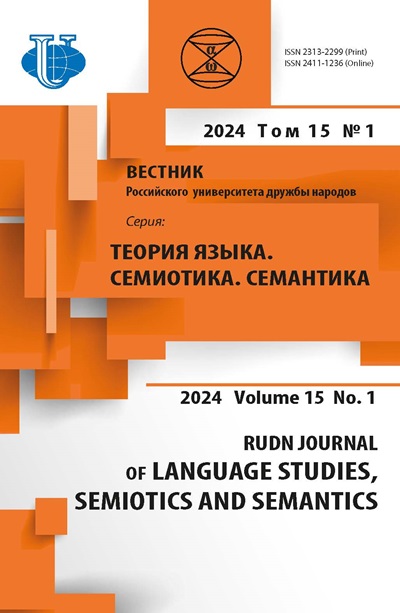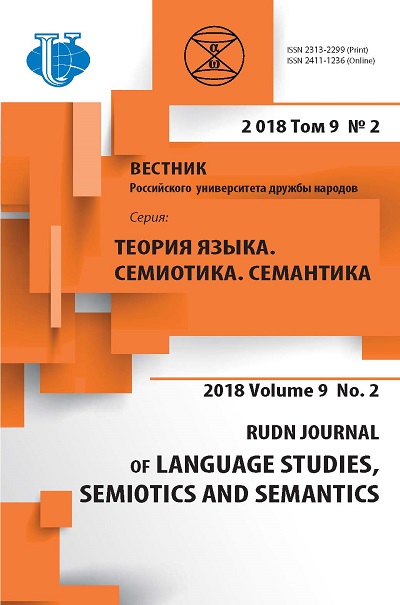THE DIFFERENCES IN PERCEPTION OF THE BASIC VALUE “DEVELOPMENT” IN PUBLIC LINGUISTIC COSCIOUSNESS OF RUSSIAN GENERATIONS ON THE BASIS OF ASSOCIATIVE DICTIONARIES AND THE DATA OF THE PSYCHOSEMANTIC EXPERIMENT
- Authors: Zhamaletdinova E.K.1
-
Affiliations:
- Faculty member of Institute of International Relations and Social and Political Sciences, MSLU
- Issue: Vol 9, No 2 (2018)
- Pages: 273-286
- Section: Functional and Comparative semantics
- URL: https://journals.rudn.ru/semiotics-semantics/article/view/18743
- DOI: https://doi.org/10.22363/2313-2299-2018-9-2-273-286
Cite item
Full Text
Abstract
This article examines the meaning of basic value “development” reflected on the common level of linguistic consciousness of representatives of two generations: the one of “perestroika” times and the Post Soviet one. The common level of linguistic consciousness is revealed through analysis of associative dictionaries and the results of the psycho-semantic experiment. The analysis of the articles from associative dictionaries helps to distinguish components of the meaning of the basic value under investigation on the common level of linguistic civil consciousness. The data of the psycho-semantic experiment that is presented as factor matrices and cluster trees allow to capture connotative differences of the perception of the value in question and trace the link with such values as “labour” and “cooperation”. We resort to historical, sociological and statistic data in order to interpret the results of the analysis. The methodology of the research is based on the theory of activity approach elaborated by Leontiev A.N., the conception of linguistic consciousness of Tarasov E.F. and Ufimtseva N.V. and the intergrative and eclectic approach by the mixed method designed by Yanchuk V.A. The results of the given research show that there were not significant shifts in the perception of the value “development” on the common level of linguistic consciousness of the two generations. However we can spotted the changes in the contents of the value in question on the linguistic common level of civil consciousness due to the movement from the industrial type of economy to the postindustrial one that is characterized by the growing significance of intellect. The methods of the analysis can be potentially used for similar research of basic values of national cultures. The materials of this paper can be employed to create tasks for Russian as Foreign language classes.
About the authors
Elmira Khamitovna Zhamaletdinova
Faculty member of Institute of International Relations and Social and Political Sciences, MSLU
Author for correspondence.
Email: khamitovich@gmail.com
faculty member of the Department of linguistics and professional communication in the field of political sciences of the Institute of International Relations and Socio-political sciences in Moscow State Linguistic University; scientific interests: axiology, cultural linguistics, sociolinguistics, psycholinguistics
Ostozhenka street, 38, Moscow, Russia, 119034References
- Stepin, V.S. (2010). New philosophical encyclopedia. Moscow. (In Russ).
- Parsons, T. (1966). The Concept of Society: The Components and Their Interrelations. In: T. Parsons. Societies: Evolutionary and Comparative Perspectives. Englewood Cliffs (NJ): Prentice-Hall. рp. 5—29.
- Parsons, T. (1991). The social system. London: Routledge.
- Lapin, N.I. Universal values and diversity of life worlds of people URL: http://www.lihachev.ru/ chten/6514/7204/7206/ (accessed 17.03.2018). (In Russ).
- Lapin, N.I. Values, interest groups and the transformation of Russian society URL: http://ecsocman.hse.ru/rubezh/msg/16439645.html (accessed 17.03.2018). (In Russ).
- Sherdakov, V.N. (1974). Social-psychological analysis of Christian morality. Leningrad: State museum of religion and atheism MK RSFSR. (In Russ).
- Tarasov, E.F. (2012). The problem of the analysis of the universal value meaning. Journal of Psycholinguistics, 1(15). 8—17 (In Russ).
- Tarasov, E.F. (2014). The prolegomena for the theory of linguistic consciousness. Journal of Psycholinguistics, 4 (22). 24—36. (In Russ).
- Semenova, V.V. (2009). Social dynamics of generations: problem and reality. M.: Russian political encyclopedia. (In Russ).
- Yanchuk, V.A. (2001). Integrational and eclectic approach to the analysis of psychological phenomenology. Minsk: Akademiya postdiplomnogo obrazovaniya. (In Russ).
- Nistratov, A.A. (2015). The image of Russia in the eyesight of foreigners. The Problems of Psycholinguistics. 1(23). 33—44. (In Russ).
- Krasin, Yu.A. (2015). The world-view credo of innovative modernization of society. In: Rossiiskaya politicheskaya nauka: Idei, kontseptsii, metody. Moscow: Aspekt Press. 239—254. (In Russ).
- Paneyakh, E. It got nervous, filthy, rude in the Internet. URL: https://daily.afisha.ru/relationship/ 3373-v-internete-kak-to-stalo-nervnogryaznogrubo/?utm_source=subscription&utm_medium= email_daily&utm_campaign=daily_2016-10-28 (accessed 18.03.2018)
- Laikam, K.E. (2016). Labor, employment and unemployment in Russia (the results of selective research of labor force). Moscow: Rosstat. (In Russ).
- Gudkov, L.D., Dubin, B.V. & Zorkaya, N.A. (2011). The youth of Russia. Moscow: Moscow School of Political Research publ. (In Russ).
- Osgood, C.E., Suci G. J. & Tannenbaum, Percy H. (1957). The measurement of meaning. Urbana, Chicago and London: University of Illinois Press.
- Bezrukova, V.S. (2000). Basics of Spiritual Culture. Ekaterinburg. (In Russ).
- Latov, Yu.V. (2014). Continuous education — a stimulus of human development and a factor of socio-economic inequality. Moscow: TsSPiM. (In Russ).
- Leontiev, A.N. (1975) Activity. Consciousness. Personality. Moscow: Politizdat publ. (In Russ).
- Leontiev, D.A. (1996). A value as an interdiscipline notion: the experience of multilayer reconstructions. The Problems of Philosophy. 4. 15—26. (In Russ).
- Cherkasova, G.A. & Ufimtseva, N.V. EVRAD: Russian regional associative dictionary-thesaurus. URL: http://iling-ran.ru/main/publications/ evras (accessed: 12.03.2018) (In Russ).
- RAD: Russian associative dictionary. URL: http://tesaurus.ru/dict/dict.php (accessed: 12.03.2018) (In Russ).













